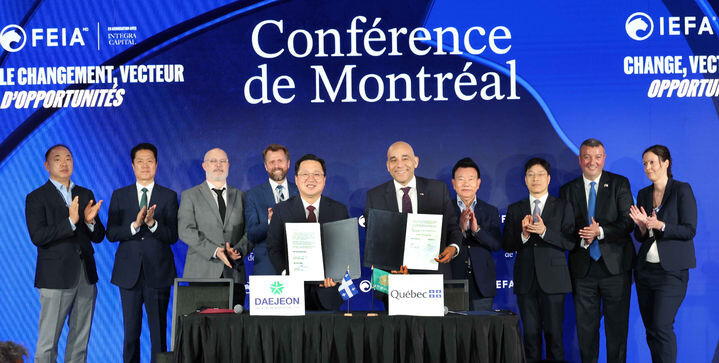
DAEJEON, South Korea – Daejeon Mayor Lee Jang-woo held a meeting with representatives from the Canadian province of Quebec on June 11 (local time) in Montreal, where he attended the international policy forum, 'Conference of Montreal.' The meeting focused on exploring cooperation opportunities in the aerospace industry. This gathering is seen as a crucial step for Daejeon to strengthen its international standing as a hub for South Korea's aerospace industry and to create synergy with Quebec's advanced aerospace technology and infrastructure.
Daejeon is the center of South Korea's science and technology research and development, and a city where numerous aerospace research institutions are concentrated. The Korea Aerospace Research Institute (KARI) and the Agency for Defense Development (ADD), along with many advanced technology companies and research institutes, are located within the Daedeok Innopolis. This allows Daejeon to boast outstanding capabilities in various fields, including space launch vehicles, satellite technology, and aircraft component development.
Notably, Daejeon was recently designated as the 'National Space Industry Cluster's Satellite Specialization Zone,' receiving full governmental support. This has further accelerated the establishment of infrastructure and the attraction of companies for the creation of a robust space industry ecosystem. Against this backdrop, Daejeon City is pursuing a strategy to expand its global aerospace industry footprint through international cooperation.
Quebec is one of Canada's key aerospace industry hubs, with multinational corporations such as Bombardier, a world-renowned aircraft manufacturer, and Pratt & Whitney located primarily around Montreal. This region boasts unparalleled technological prowess in aircraft design, manufacturing, maintenance, and engine development, and also possesses well-established related research institutions and human resource training systems. The Quebec provincial government is actively investing in and fostering the aerospace sector as a core strategic industry. Therefore, cooperation with Daejeon City is expected to be mutually beneficial for the advancement of aerospace technology and the strengthening of industrial competitiveness in both regions.
During the meeting, Mayor Lee Jang-woo likely introduced Daejeon's aerospace industry capabilities and vision, proposing concrete avenues for cooperation with Quebec. Potential areas of collaboration could include: ▲joint research and development projects; ▲personnel exchange and training programs; ▲technology partnerships and investment attraction between companies; and ▲support for nurturing aerospace startups. In particular, combining Daejeon's strengths in satellite development and utilization with Quebec's expertise in aircraft components and systems could maximize synergy. Furthermore, discussions may have also covered cooperation in areas of mutual interest such as utilizing satellite data for climate change response or developing next-generation air mobility solutions.
The Conference of Montreal is a prestigious forum where policymakers, business leaders, and scholars from around the world gather to discuss various global issues in economics, society, and technology. Daejeon City's decision to hold an aerospace industry meeting with Quebec at this event demonstrates Daejeon's strong commitment to playing a key role in the global aerospace market, extending beyond its domestic boundaries. If practical cooperation projects between the two regions materialize in the future, it is anticipated to significantly contribute to the development of the aerospace industries in both South Korea and Canada, as well as to global aerospace technological advancement. This meeting is expected to be an important first step in ushering in an era of aerospace cooperation between Daejeon and Quebec.
[Copyright (c) Global Economic Times. All Rights Reserved.]






























